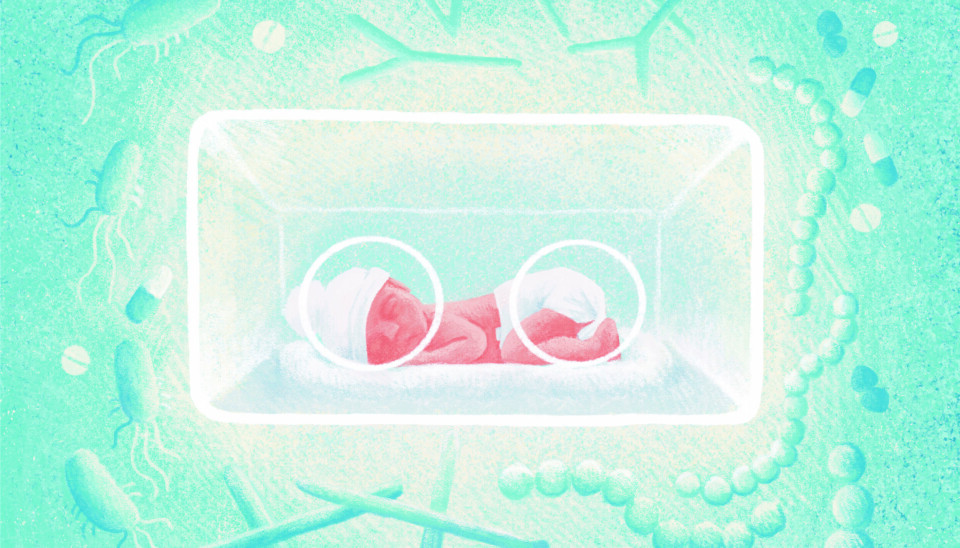Share your science:

How beneficial bacteria can help premature babies thrive
SHARE YOUR SCIENCE: A similar type of probiotics that you take to prevent getting the runs when travelling can save lives of prematurely born babies.
Do you know
of women in your family, or perhaps other acquaintances of yours, who gave birth
before the seventh month of pregnancy?
Every year about 15 million preterm babies are born worldwide who are at high risk of infection and inflammation. Preterm means that they are born weeks or even months before their expected due date.
Compared to term babies, preterm babies’ bodies have an underdeveloped immune system, impaired gut barrier function, and a very immature microbial community in the large intestine.
The compromised gut barrier increases the chance of gut bacteria being transferred to the bloodstream, resulting in life-threatening sepsis.
Probiotic bacteria can assist newborns in various ways, including training their immune systems and eradicating harmful bacteria from the gut.
Besides, as a result of being hospitalised, preterm newborns are exposed to pathogenic bacteria that can confer antibiotic resistance and cause diseases. Additionally, preterm babies have a low number of beneficial gut bacteria.
Because of these circumstances, antibiotics are frequently given to vulnerable preterm babies to prevent infection and sepsis. Unfortunately, antibiotics also kill or suppress the beneficial bacteria, resulting in pathogenic bacteria overgrowth. As a result, the antibiotic use might aggravate the developing infection.
So, what to do?
Ph.D student Ahmed Bargheet at UiT has investigated the benefits of using probiotics instead of antibiotics to protect the gut health of premature babies. (Video: YouTube)
Beneficial microorganisms
To mitigate the negative consequences of antibiotic use and reduce rates of devastating illness, such as sepsis and necrotising enterocolitis, preterm babies in intensive care units might receive probiotics. That is, bacteria that naturally exist in the human gut and have proven health benefits. It is a similar kind of bacteria that people buy without a prescription to prevent getting the runs while travelling abroad.
Bacteria, and other microorganisms, have been commonly thought of as something that makes people sick. However, the human body is eventually colonised with billions of bacteria. Most live in valuable symbiosis with us humans, but some have pathogenic potential.
Probiotics are beneficial microorganisms that can keep the human body functioning properly. Probiotic bacteria can assist newborns in various ways, including training their immune systems and eradicating harmful bacteria from the gut.
For bacteria to qualify as probiotics to be used in neonatal intensive care units, they must be isolated from humans, survive in the intestine, be safe, not cause disease, and importantly, have documented health advantages.
How do probiotics work?
Probiotics can fight off harmful bacteria and restore gut balance, rendering preterm babies’ gut bacteria more like healthy full-term babies. For example, probiotic bacteria can:
- Make natural antibiotics (bacteriocins) that eradicate the detrimental bacteria
- Produce metabolites that limit the growth of harmful bacteria
- Outcompete pathogenic bacteria for nutrients
- Activate the immune system
- Help to maintain the strength of the protective lining in the intestines, the epithelial barrier. By doing so, they reduce the chances of harmful bacteria making their way into the bloodstream.
Probiotic use leads to fewer antibiotic resistant genes…
In our new study, we document that probiotics boost microbiota maturation in preterm infants to levels comparable with full-term newborns. Additionally, we found that despite being extensively treated with antibiotics, probiotic-supplemented preterm newborns had bacteria that carried substantially less antibiotic resistance genes than babies that did not receive probiotics.
The amounts and composition of antibiotic resistant genes in the probiotic-supplemented preterm infants were similar to term newborns who did not receive antibiotics.
...but might increase gene transfer across bacteria
However, we also made a novel finding that the probiotic-supplemented preterm newborns had higher carriage of mobile genetic elements (MGEs) within their gut bacteria, when compared to term newborns or preterm infants not supplemented with probiotics. These MGEs have the capacity to transfer genes, including those carrying antibiotic resistance, between bacterial species.
These surprising results suggest that probiotic supplementation, along with other factors, such as long hospital stay and antibiotic use, influence the overall presence of MGEs. To really understand how probiotic bacteria affect antibiotic resistance and gene transfer in babies' guts, further clinical research will be essential.
Scientific reference:
- Development of early life gut resistome and mobilome across gestational ages and microbiota-modifying treatments https://www.thelancet.com/journals/ebiom/article/PIIS2352-3964(23)00178-0/fulltext
- Facts about probiotics
Probiotics are live bacteria and yeasts promoted as having various health benefits. They're usually added to yoghurts or taken as food supplements and are often described as "good" or "friendly" bacteria.
https://www.nhs.uk/conditions/probiotics/ - The microbiome explained
Picture a bustling city on a weekday morning, the sidewalks flooded with people rushing to get to work or to appointments. Now imagine this at a microscopic level and you have an idea of what the microbiome looks like inside our bodies, consisting of trillions of microorganisms (also called microbiota or microbes) of thousands of different species.
https://www.hsph.harvard.edu/nutritionsource/microbiome/
Share your science or have an opinion in the Researchers' zone
The ScienceNorway Researchers' zone consists of opinions, blogs and popular science pieces written by researchers and scientists from or based in Norway.
Want to contribute? Send us an email!




























